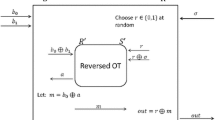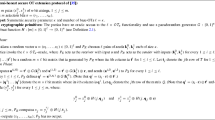Abstract
We show that oblivious transfer of bits from A to B can be obtained from a single instance of the same primitive from B to A. Our reduction is perfect and shows that oblivious transfer is in fact a symmetric functionality. This solves an open problem posed by Crépeau and Sántha in 1991.
The original version of this chapter was revised: The copyright line was incorrect. This has been corrected. The Erratum to this chapter is available at DOI: 10.1007/978-3-540-34547-3_36
Chapter PDF
Similar content being viewed by others
Keywords
These keywords were added by machine and not by the authors. This process is experimental and the keywords may be updated as the learning algorithm improves.
References
Beaver, D.: Foundations of Secure Interactive Computing. In: Feigenbaum, J. (ed.) CRYPTO 1991. LNCS, vol. 576, pp. 377–391. Springer, Heidelberg (1992)
Beaver, D.: Precomputing oblivious transfer. In: Coppersmith, D. (ed.) CRYPTO 1995. LNCS, vol. 963, pp. 97–109. Springer, Heidelberg (1995)
Bennett, C.H., Brassard, G., Crépeau, C., Skubiszewska, H.: Practical quantum oblivious transfer. In: Feigenbaum, J. (ed.) CRYPTO 1991. LNCS, vol. 576, pp. 351–366. Springer, Heidelberg (1992)
Brassard, G., Crépeau, C., Wolf, S.: Oblivious transfers and privacy amplification. Journal of Cryptology 16(4), 219–237 (2003)
Crépeau, C.: Correct and private reductions among oblivious transfers, Ph. D. Thesis, Massachusetts Institute of Technology (1990)
Crépeau, C.: Efficient cryptographic protocols based on noisy channels. In: Fumy, W. (ed.) EUROCRYPT 1997. LNCS, vol. 1233, pp. 306–317. Springer, Heidelberg (1997)
Crépeau, C., Kilian, J.: Achieving oblivious transfer using weakened security assumptions. In: Proceedings of the 28th Symposium on Foundations of Computer Science (FOCS 1988), pp. 42–52. IEEE, Los Alamitos (1988)
Crépeau, C., Morozov, K., Wolf, S.: Efficient unconditional oblivious transfer from almost any noisy channel. In: Blundo, C., Cimato, S. (eds.) SCN 2004. LNCS, vol. 3352, pp. 47–59. Springer, Heidelberg (2005)
Crépeau, C., Sántha, M.: On the reversibility of oblivious transfer. In: Davies, D.W. (ed.) EUROCRYPT 1991. LNCS, vol. 547, pp. 106–113. Springer, Heidelberg (1991)
Even, S., Goldreich, O., Lempel, A.: A randomized protocol for signing contracts. Communications of the ACM 28(6), 637–647 (1985)
Goldreich, O.: Foundations of Cryptography, Volume II: Basic Applications. Cambridge University Press, Cambridge (2004)
Imai, H., Müller-Quade, J., Nascimento, A., Winter, A.: Rates for bit commitment and coin tossing from noisy correlation. In: Proceedings of the IEEE International Symposium on Information Theory (ISIT) 2004. IEEE, Los Alamitos (2004)
Imai, H., Nascimento, A., Winter, A.: Oblivious transfer from any genuine noise (unpublished manuscript, 2004)
Kilian, J.: Founding cryptography on oblivious transfer. In: Proceedings of the Twentieth Annual ACM Symposium on Theory of Computing (STOC 1988), pp. 20–31 (1988)
Mayers, D.: Unconditionally secure quantum bit commitment is impossible. Phys. Rev. Lett. 78, 3414–3417 (1997)
Micali, S., Rogaway, P.: Secure computation. In: Feigenbaum, J. (ed.) CRYPTO 1991. LNCS, vol. 576, pp. 392–404. Springer, Heidelberg (1992)
Naor, M., Pinkas, B.: Oblivious transfer and polynomial evaluation. In: Proceedings of the Thirty-First Annual ACM Symposium on Theory of Computing (STOC 1999), pp. 245–354 (1999)
Ostrovsky, R., Venkatesan, R., Yung, M.: Fair games against an all-powerful adversary. AMS DIMACS Series in Discrete Mathematics and Theoretical Computer Science, vol. 13, pp. 155–169 (1990)
Rabin, M.: How to exchange secrets by oblivious transfer, Technical Report TR-81, Harvard Aiken Computation Laboratory (1981)
Rivest, R.L.: Unconditionally secure commitment and oblivious transfer schemes using private channels and a trusted initializer (unpublished manuscript, 1999)
Shannon, C.E.: A mathematical theory of communication. Bell System Technical Journal 27, 379–423, 623–656 (1948)
Winter, A., Nascimento, A., Imai, H.: Commitment capacity of discrete memoryless channels. In: Paterson, K.G. (ed.) Cryptography and Coding 2003. LNCS, vol. 2898, pp. 35–51. Springer, Heidelberg (2003)
Wolf, S., Wullschleger, J.: Zero-error information and applications in cryptography. In: Information Theory Workshop (ITW) 2004. IEEE, Los Alamitos (2004)
Wolf, S., Wullschleger, J.: New monotones and lower bounds in unconditional two-party computation. In: Shoup, V. (ed.) CRYPTO 2005. LNCS, vol. 3621, pp. 467–477. Springer, Heidelberg (2005)
Wyner, A.D.: The wire-tap channel. Bell System Technical Journal 54(8), 1355–1387 (1975)
Yeung, R.W.: A new outlook on Shannon’s information measures. IEEE Transactions on Information Theory 37(3), 466–474 (1991)
Author information
Authors and Affiliations
Editor information
Editors and Affiliations
Rights and permissions
Copyright information
© 2006 Springer-Verlag Berlin Heidelberg
About this paper
Cite this paper
Wolf, S., Wullschleger, J. (2006). Oblivious Transfer Is Symmetric. In: Vaudenay, S. (eds) Advances in Cryptology - EUROCRYPT 2006. EUROCRYPT 2006. Lecture Notes in Computer Science, vol 4004. Springer, Berlin, Heidelberg. https://doi.org/10.1007/11761679_14
Download citation
DOI: https://doi.org/10.1007/11761679_14
Publisher Name: Springer, Berlin, Heidelberg
Print ISBN: 978-3-540-34546-6
Online ISBN: 978-3-540-34547-3
eBook Packages: Computer ScienceComputer Science (R0)


